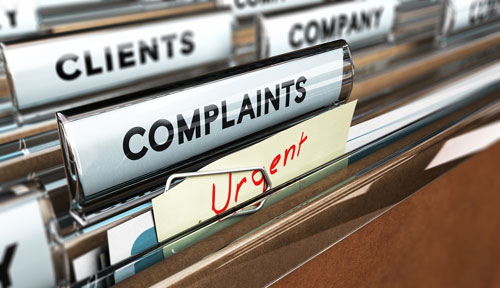Handling complaints in a positive way produces tangible benefits for your organization.

Early on in my career I discovered the truth of this quote:
Statistics suggest that when customers complain, business owners and managers ought to get excited about it. The complaining customer represents a huge opportunity for more business.
— Zig Ziglar
By listening attentively and respectfully to the client, and by doing my best to resolve the situation, the result was usually a stronger relationship with the client—for me as well as for the organization I represented.
That said, it didn’t stop me from feeling panicky whenever a customer complained. Largely because I didn’t recognize the impact effectively handling a complaint had on client loyalty.
It took me years to finally see that most of the complaints I handled resulted in a stronger client relationship. Why? Because my behavior showed the client that I, and the organization they were dealing with, cared about them and their problem. Our actions demonstrated that we wanted to resolve the complaint to their satisfaction. This built trust and loyalty with the client.
In the short-term this meant that:
On occasion, we had to own a problem that wasn’t really our fault—without saying so to the customer. (While the customer may not always be right, the customer is pretty much always right.)
The complaint may have cost us something to remedy—but far less than bad word-of-mouth advertising might have had if we hadn’t resolved it promptly, satisfactorily and respectfully.
In the long-term this meant that:
Our clients felt like we cared (and we did)—we listened carefully, acknowledged the problem and remedied the situation as best we could.
Our clients stayed with us and often became loyal brand advocates—they didn’t expect us to be perfect, they did expect us to own up to problems and fix them.
Handling customer complaints is not rocket science. It’s really a matter of putting ourselves in our clients’ position. How would we want our complaint handled? How would we want to be listened to, spoken to and dealt with?
If we’re looking to build a profitable business with a loyal client base, giving service that goes above and beyond the average is key. And, it often results in clients becoming brand ambassadors who fan the flames of great word-of-mouth advertising as a bonus.
When a customer complains it is an opportunity to strengthen our relationship with him or her. They are looking for resolution to their problems and in the process we have the chance to handle it in a way that strengthens both our relationship and our brand with the client.
When clients feel:
– heard and understood (we’ve listened as they tell us about the problem/experience)
– important and respected (our body language, our words and the tone of our voice says we care)
…they are also more likely to be calm and rational about the problem as opposed to emotional and reactionary.
In my experience, most customers don’t like to complain or create a fuss when they experience a problem with a product or service. They just want the issue resolved. But actually confronting the person/business about the problem is uncomfortable for them.
Handling complaints in a positive way is often pleasantly surprising to customers—a surprise they often share with their friends. Of course the reverse is true too. Except that when you handle a complaint poorly your client is likely to tell even more people—and this kind of word-of-mouth advertising most of us can do without.
About the Author
Sue Cockburn is the owner of Growing Social Biz. Growing Social Biz help small businesses increase their impact, expand their market share and improve their bottom-line through social media and internet marketing.




